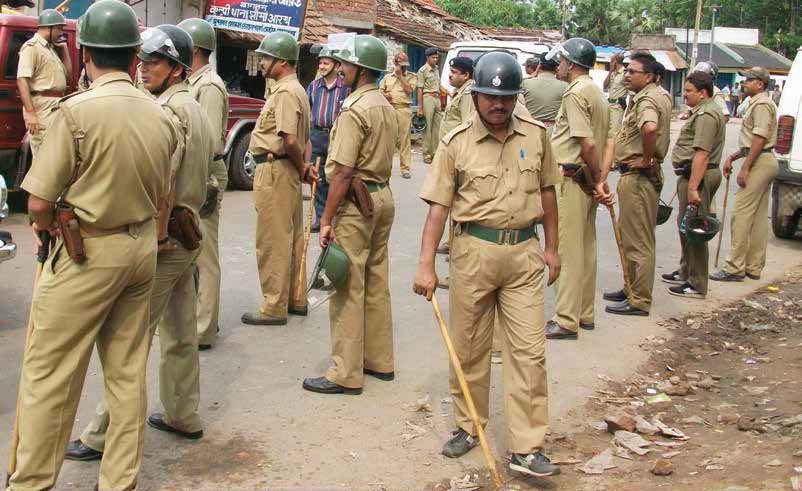This article is written by Koushik Chittella who is currently studying BBA LL.B at Dr. Ambedkar Global Law Institute, Tirupati. This article briefly describes different cases on anticipatory bail in great detail while making the reader understand the whole purpose and the scope of bail and its provisions.
It has been published by Rachit Garg.
Table of Contents
Introduction
The Code of Criminal Procedure (CrPC) is the legislation that governs the administration of criminal proceedings in the country. It was enacted in 1973. Offences are classified into two based on their bailable nature, i.e., bailable offences and non-bailable offences. An offence in simple language is an act or an omission prohibited by law. The concept of bail is still controversial in our country because the public feels that the accused might flee after issuing a bail. There are three types of bail namely regular bail, interim bail, and anticipatory bail. This article briefly discusses the concept of anticipatory bail and important case laws decided in its regard in the Supreme Court.
Bailable offence
A bailable offence is an offence that is not on its own very serious in nature. The bail may be granted to the accused only if he satisfies the essentials of procuring bail.
Examples of bailable offences: Selling noxious foods or drinks, rioting with a weapon, fabrication of false evidence, etc.
Bail
The term bail is not defined anywhere in the Code of Criminal Procedure. In general, bail is defined as a process of releasing an accused for a sum and it is also a promise that he will be attending the Court proceedings in the future. Bail is argued to be a right of the individual that is granted by the Constitution under Article 21.
If a person has committed an offence that is bailable in nature, he can demand bail. He needs to sign a “bail bond” which contains the terms and conditions on which a person will be released on bail. Any person who is on bail should stay within the Court’s territorial jurisdiction.
Aasu v. the State of Rajasthan (2017)
Facts of this case: All 4 accused in this case are booked under Section 302 and Section 34 of the Indian Penal Code. The lower court granted anticipatory bail for all the other co-accused. The petitioner in the instant case also filed an application for anticipatory bail which was not decided for a long time. He challenged the same in the High Court.
Issue: Whether there is a prescribed time limit that a court shall dispose off bail applications?
Judgement: The Court has delivered a judgement that all the bail applications shall be disposed within a week of their filing.
Types of Bail
There are 3 types of bail available for a person. They are:
- Regular Bail
- Interim Bail
- Anticipatory Bail
Regular Bail
A person who is arrested and in police custody can apply for a regular/daily bail. Bail provisions are given under Section 437 and 439 of the Code of Criminal Procedure.
Sanjay Chandra v. CBI 2011
Facts of this case: The accused were charged with manipulation and misappropriation to influence UAS licences of the telecom industry. The Special Judge CBI, rejected the bail applications of the accused for which the accused appealed the validity of the said rejection of bail in the High Court of Delhi which was denied on 23.05.2011. The accused appealed to the Apex Court.
Issue: Whether the Court can reject an application of bail without proper reasoning?
Judgement: The Supreme Court delivered a judgement mentioning that the grant and rejection of bail application are at the sole discretion of the Court as the situations and circumstances should be carefully studied before grant or rejection of bail.
Interim Bail
Interim bail is awarded by a direct order of the Court to temporarily release an accused for a short term. The Courts noticed that interim bails are being misused in many cases and have decreased the number of interim bails issued.
Anticipatory Bail
Anticipatory bails are issued prior to the arrest of a person. It is also called a pre-arrest bail. It is mentioned under Section 438 of the Code of Criminal Procedure as ‘grant apprehending arrest’. The requirement of anticipatory bail has seen a rise in the early 1990s when there were a lot of false cases being filed on businessmen. To protect the interests of the public, the Law Commission has suggested adding a provision prohibiting arrest beforehand. As it is a matter of the personal liberty of a man, it was added to the Code.
According to Section 438 of CrPC, a person having committed an offence anticipates his arrest wherein he can approach the High Court or the Sessions Court for anticipatory bail. It is at the discretion of the Court whether to grant bail or reject the same. It solely depends on the circumstances and the seriousness of the offence. Anticipatory bail can be granted for a non-bailable offence and will be valid only if the person has no direct connection or when the Court believes that the person is innocent.
Cancellation of Bail
Uday Mohanlal Acharya v. the State of Maharashtra (2001)
Facts of this case: The accused filed an application for bail after non-completion of investigation by the investigation agency.
Issue: Whether the Court can reject or cancel bail after the challan is issued?
Judgement: The Court cleared that the custody of the accused after the challan is not governed under Section 167 CrPC. The Apex Court has delivered its verdict stating that bail can be cancelled at any time even when he is at his committal proceedings.
Important cases on Anticipatory Bail
Grant of Anticipatory Bail
Gurbaksh Singh Sibbia v. the State of Punjab (1980)
The very first landmark judgement was given by the Apex Court is in the case of Gurbaksh Singh v. the State of Punjab.
Facts: The Minister of irrigation and power being Mr. Gurubaksh Singh and others from the government were facing serious allegations of corruption and misuse of power. They had applied for anticipatory bail in the High Court, but it was rejected. They filed an SLP for the Supreme Court to consider the case.
Issues:
- Whether a person can apply for anticipatory bail with the reason to believe being “mere fear”?
- Whether the life of anticipatory bail is limited?
- Whether the Court needs to examine any conditions before issuing anticipatory bail?
- Whether the Court can limit the anticipatory bail?
- Whether a Court can grant anticipatory bail after the arrest of a person?
Judgement: The Court allowed the appeal in part and critically examined the provisions of the Code. The judgement of this case has cleared the prevailing issues on anticipatory bail and has given eight conditions that all the lower Courts issuing anticipatory bail must follow.
The Court in its judgement directed that a person cannot necessarily file an application for anticipatory bail with the reason being “fear”. The life of bail can’t be determined as the conclusion of trials can not be assured by the Court. The Court has given 8 necessary conditions that all the Courts need to consider before granting bail and has given a statement that there should be a balance between the rights of the individuals and the provisions of police during investigation.
The Magistrate or a Judge granting anticipatory bail may impose conditions as per the situations and the seriousness of the reason to believe. No anticipatory bail can be given by any Court after arrest. The Court has also mentioned that it is at the discretion of the Court as to recall or cancel the bail order of a person. The person should apply for a regular bail under Section 437 of the Code.
Rahna Jalal v. the State of Kerala (2020)
Facts of the case Rahna Jalal v. the State of Kerala: The accused committed an offence under Muslim Women (Protection of Rights on Marriage) Act 2019.
Issue: Whether the Court can grant an anticipatory bail on an issue related to the Muslim Women and Protection?
Judgement: The Apex Court took up the case and answered the issue that an anticipatory bail can be granted only when the Court issuing bail has heard the complainant itself.
Amiya Kumar Sen v. the State of West Bengal (1979)
Facts of the case: The accused challenged the validity of the Sessions Court rejecting the bail wherein he filed another application in the High Court for the same.
Issue: Whether a person can file the same bail application in the sessions and High Courts?
Judgement: The Apex Court clearly mentioned that both the sessions and high Court are empowered to issue anticipatory bail to a person. The judgement stated that if the sessions Court denies bail, the same petition can’t be tried in the high Court. The party can appeal to the high Court but it is at the discretion of the Court whether to entertain the petition or not.
The right reason to believe
Savitri Agarwal v. State of Maharashtra and Another (2009)
Facts of the case Savitri Agarwal v. State of Maharashtra: The appellants applied for anticipatory bail at the sessions Court where the bail was granted and protection from arrest was given to the appellants. The State appealed to the High Court that the reason to believe is not examined by the Sessions Court and prayed the High Court to cancel the bail given to the appellants. Further, the bail is cancelled by the High Court mentioning that the Sessions Court committed an error and has not examined the facts and circumstances of the case. The appellants appealed to the Apex Court.
Issue: Whether a Court can cancel/reject a bail application with the right reason to believe?
Judgement: The Apex Court delivered its verdict that the Sessions Court has examined all the facts and circumstances and rightfully presented the bail to the appellant and the High Court has exceeded its thought and cancelled the bail based on the appeal by the state and others.
The Apex Court has reversed the order passed by the High Court and provided the appellant with the bail. The Court in this case gave a guideline to the lower Courts that the reason to believe should satisfy the requirement of anticipatory bail and it should be granted only after clear examination of facts of the case.
Vaman Narayan Ghiya v. State of Rajasthan (2009)
Facts of the case: The applicant of the anticipatory bail just suspected and applied for the bail.
Issue: Whether a person can file an application for anticipatory bail with mere suspension?
Judgement: The Court, while rejecting the bail, mentioned that the reason to believe must satisfy the Court and direct it towards the actual requirement of the anticipatory bail. The reason to believe the requirement of bail must depend on the facts and circumstances and not just fear and suspicion. The accused should present reasonable facts that might help the Court analyse the importance of anticipatory bail in such cases.
Is Anticipatory Bail a fundamental right for a person
State of MP v. Rama Krishna Balothia and Anr. (1995)
Facts of this case: Several persons filed applications for anticipatory bail as they were suspected to be arrested under SC\ST Atrocities Act. The counsel argued that anticipatory bail is a fundamental right of a person.
Issue: Whether anticipatory bail is a fundamental right for a person?
Judgement: The Supreme Court delivered its judgement stating that getting an anticipatory bail should not be considered a fundamental right as it is merely a special privilege granted when it is duly necessary and the Courts should not entertain any such bail applications which are contrary to the necessary conditions. The Court also mentioned that personal liberty is granted under Article 21, but not all applications are necessarily made for the protection of personal liberty.
Life of Anticipatory Bail
Sushila Aggarwal and Others v. State (NCT of Delhi) (2020)
- Facts in the instant case: The petitioner’s bail was first cancelled in the Sessions Court, the petitioner appealed to the High Court of Madhya Pradesh. The applicant challenged the validity of the Court bounding the time period of the bail issued by the High Court.
Issue:
1. Whether the protection provided under Section 438 can be limited to a fixed period?
2. Whether the bail is valid after the trial commences?
Judgement: The Apex Court while answering the first issue stated that as a general rule, anticipatory bail itself is not strictly bound by time. Any Court issuing bail under Section 438 can impose some conditions as to territory and jurisdiction etc.
The Court in its verdict stated that the bail will not be invalid as and when the trial starts but it stays to be valid till the end of the proceedings. The Apex Court empowered the lower Courts to limit the validity of anticipatory bail under special circumstances as and when the Court deems fit.
Siddharam Satlingappa Mhetre v. State of Maharashtra (2011)
The background facts in this case include the Court setting a limitation for the bail granted to the accused to sign in the local police station. The issue decided in the case was whether the limitation set by the Court issuing bail is acceptable or not. In this case, the petitioner had requested the High Court for an anticipatory bail. The Court granted bail on one condition, that he should sign at a police station every day. The petitioner appealed to the Apex Court, the apex Court delivering its verdict set aside the order of the High Court and stated that conditions related to territory and others can be limited by the Court issuing bail but they should not be contrary to the guidelines set by the SC.
Rejection of Anticipatory Bail
M. C. Abraham and Another v. the State of Maharashtra and Others (2002)
In the instant case, the appellants applied for anticipatory bail under Section 438 of CrPC in the High Court of Maharashtra. The High Court rejected the bail application and issued arrest against him. The applicant appealed to the Apex Court wherein the Apex Court delivering its verdict mentioned that rejection of bail doesn’t mean that the applicant should necessarily be arrested. He may or may not be arrested based on the case and should not be based on the grant/rejection of bail.
Bhadresh Bipinbhai Sheth v. State of Gujarat (2015)
In the case of Bhadresh Bipinbhai v. State, the facts include the lower court rejecting the application of bail without any proper justification. The Court stated that rejection of anticipatory bail when all the conditions are satisfied and without any proper justification by the Court may be said as the violation of Article 21 of the Indian Constitution and the person can appeal to the High Court immediately.
State (Rep by C.B.I) v. Anil Sharma (1997)
The facts in this case were that the minister of telecommunications and his son were accused of corruption by the state (Central Bureau of Investigation). The minister applied for anticipatory bail at the High Court. The Court while rejecting the bail stated that in sensitive matters such as corruption, the Court should carefully examine the position of the applicant, and if he is at a high position, he can trouble the investigation agency by undue influence. So, in such matters the bail should be prima facie rejected.
Cancellation of Anticipatory Bail
State of Maharashtra v. Vishwas (1978)
Facts of the case: The applicants herein applied for an anticipatory bail read under Article 227 of the Constitution and Section 438 of the Code of Criminal Procedure, 1973. The High Court granted bail as it found the bail necessary. Later, when it was found that bail was not necessary, the Court cancelled the bail.
Issue: Whether the Court has the power to cancel the bail issued after critical examination of facts?
Judgement: The Court in its judgement mentioned that a Court can recall or cancel bail as and when it deems necessary. Anticipatory bail is a special privilege for a man and it should not be misused at any chance. The power of cancellation of bail lies with the Court even though there is no express provision as such.
Conclusion
The right to personal liberty under Article 21 is the most important right for all the individuals of the country. Even though there are many cases and judgements on the bail system, there is a greater need for a complete review of the bail system and the Court while granting bail should consider the socio-economic conditions of the accused. The Court should examine the fact that the accused may flee after the grant of bail. In any case, there should be a perfect balance between the interests of the state and the personal liberty of the person.
References
- https://corporate.cyrilamarchandblogs.com/2021/01/decoding-the-law-on-anticipatory-bail/#:~:text=(1)%20When%20any%20person%20has,arrest%2C%20he%20shall%20be%20released
- https://indiankanoon.org/search/?formInput=cases%20on%20anticipatory%20bail
- https://lawtrend.in/important-judgments-of-supreme-Court-on-anticipatory-bail/
- https://www.mondaq.com/india/crime/982502/anticipatory-bail-and-its-laws
- https://blog.ipleaders.in/anticipatory-bail-india-legal-aspects/
- https://blog.ipleaders.in/law-anticipatory-bail-sibbia-chidambaram/
Students of Lawsikho courses regularly produce writing assignments and work on practical exercises as a part of their coursework and develop themselves in real-life practical skills.
LawSikho has created a telegram group for exchanging legal knowledge, referrals, and various opportunities. You can click on this link and join:
Follow us on Instagram and subscribe to our YouTube channel for more amazing legal content.
 Serato DJ Crack 2025Serato DJ PRO Crack
Serato DJ Crack 2025Serato DJ PRO Crack











 Allow notifications
Allow notifications


